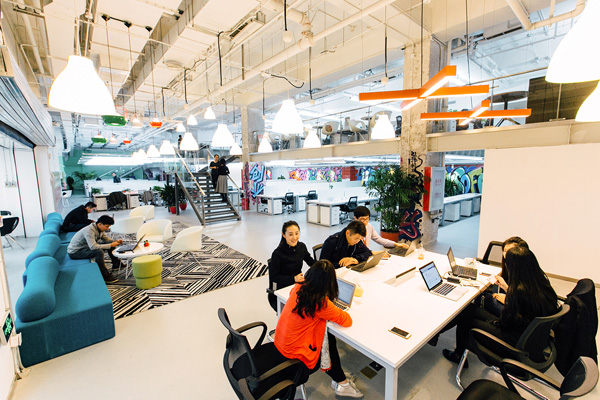 |
|
Tenants in the UrWork co-working space share a table in the public area, which is conducive to communication. [Photo provided to China Daily] |
UrWork renovated a vacant supermarket for four months to help form its first community in east Beijing. Traditional spaces are fully refurbished so co-workers can share a gym, kitchen, store, cafe and lounge.
Tenants can book a meeting room, find a designer or seek legal advice through an app.
Getting a work station costs from 1,800 yuan ($275) to 2,200 yuan a month. The spaces have already been helping to connect people and form business networks.
Startup Zhiguagua.com, which handles intellectual property registration, took up a few work stations in 2015 and provided most of its fellow tenants with registration services. Orders have increased seven-fold, and it now serves Chinese enterprises in Singapore as well, according to the company.
Another tenant, Runnar, which organizes and promotes marathons in China and around the world, worked with a charity group to raise funds and adopted a new facial-recognition technique from an IT company to position the photos of marathon runners.
"You only see desks, but it's what's behind the desks that matters. For example, we can meet our investment and financing needs," says Runnar market supervisor Zheng Hao.
"A lack of communication can kill great ideas."
In October, a report to the 19th National Congress of the Communist Party of China pointed out the gap between unbalanced, inadequate development and the people's desire for better living standards.
In a move that could help plug the problem by unshackling underused resources and tapping talent in local communities, UrWork is making inroads in the suburbs of metropolises and third-tier cities.
More businesses are also trying to be more mobile and flexible as they expand to other cities, driving the shared office market in China's third- or even fourth-tier cities.
"Time is money," says Mao.
"Enterprises take longer to find support if they don't make full use of shared-office resources."
For Li Ying, who looks after both her child and aging parents, an office that is close to home is certainly a bonus.
"I expect the suburbs to be the next pool of innovation," she says.
"My dream is to build my consultancy into a Chinese think tank."